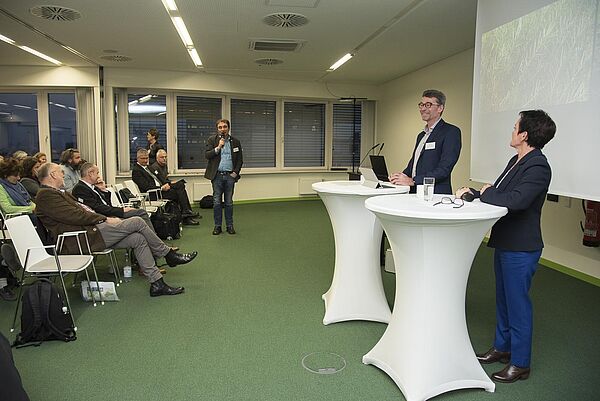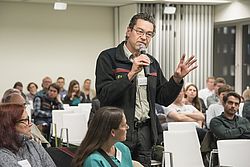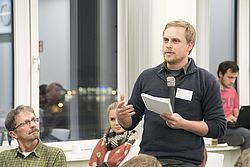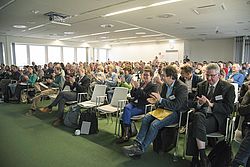"This huge response proves that the topic is very close to what foresters, researchers, nature conservation associations and politicians are very concerned about, namely, the future of our forests", said Rosemarie Heilig, Head of the Environment Department of the City of Frankfurt. Together with Hochschule Geisenheim University's Kompetenzzentrum Kulturlandschaft (KULT) der Hochschule Geisenheim (Center of Competence for Cultural Landscapes), the Environment Department of the City of Frankfurt organized the second Geisenheim Landscape Forum on November 25, 2019, also publicised as the first Frankfurt Forest Congress. Around 200 people attended. The presentations consciously focused on a balanced mixture of forestry practises and ongoing scientific debate. The lively discussion at the conclusion of the Congress was impressive proof of how broad the spectrum of opinions is at present.
"No one can offer ready-made solutions", said Prof. Dr. Eckhard Jedicke from Hochschule Geisenheim University, who also moderated the Congress. It is clear, however, that the era of monocultures and pure commercial forests is over. Our native tree species are also increasingly encountering problems with hot and dry weather conditions. "The future will see mixed cultures, natural rejuvenation and possibly, under certain conditions, tree species from the Mediterranean region," added Jedicke. Frankfurt's head of the environment department brought another point forward for discussion: " We must, however, focus more strongly than before on young trees that are suited to the location. As far as Frankfurt is concerned, we have to cultivate these new trees ourselves, preferably in our own nursery. Then we can be sure that they can handle the conditions here." Because of rising temperatures, relying completely on exotic species and transforming forests is not a solution. She took this realization home with her from the congress.
The situation is alarming: the number of dead trees in Hesse has risen sevenfold since 1985 - the peak of what was then forest extinction due to acid rain - says Stefan Nowak, head of the Department of Forest Development and Environment at the HessenForst state forestry office. Only three percent of the trees in Frankfurt's city forest are undamaged. The main problem is the drought in summer: Rising average temperatures cause a longer vegetation period and increasing evaporation by the vegetation. This makes rainfall deficits even more serious, with many trees drying out.
"What is needed is a new definition of objectives for the development and multifunctionality of forest ecosystems," concludes Jedicke. This cannot be provided by the forestry industry alone, but must be developed in a process involving society as a whole. A variety speakers made it clear that the ecosystem benefits of forests must be assessed comprehensively - forests, especially city forests such as Frankfurt's, fulfilled many tasks, i.e. as a living, recreation and leisure space and, of course, as a carbon"sink. Greater diversity by means of long-term forests with more species (with a higher genetic diversity than in the past) of different ages is a goal that can be achieved through consensus. The forest ecosystem's high carbon sink function, and of the soil especially, must be taken into account to a greater degree than before - it must not be put at risk for the sake of a large timber harvest.
Heilig und Jedicke agreed that: "It was particularly important to us that all the participants were well informed and that they came out of the congress with new ideas". "We will continue the dialogue between industry and science, because only a broad and open exchange of views can lead to innovative solutions in an area as complex as this." Together with the Rhineland-Palatinate State Forests, the Center of Competence for Cultural Landscapes is planning another conference on the impact on the forestry industry in 2020.






